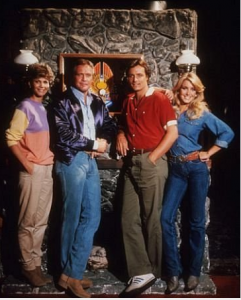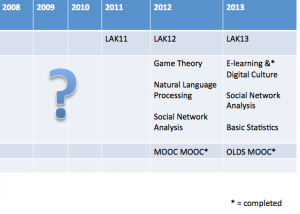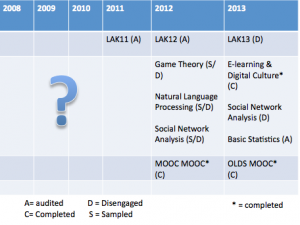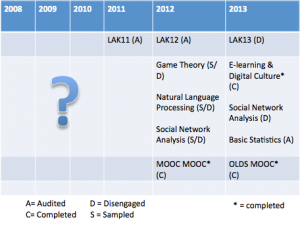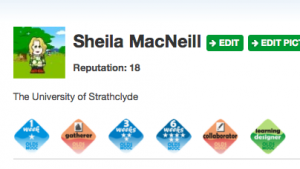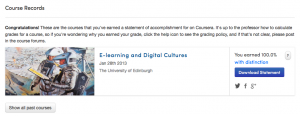Week 4 of #edcmooc is drawing to a close and I find myself in a similar position to last week re articulation. We are again grappling with what it means to be human but the readings and resources have pointed us in the direction of post humanism. I think I may have made a small break through in that I have a suspicion that the course team are just teasing us and actually want us to sign up for the MSc so we have the space to reflect and write in proper “academese” about all of this 
So I’m just going to pull out a few random thoughts which have been running around my head this week. Post humanisim – my very basic response is “it’s all a bit scary” but I am as they say a bear with little brain. Having had a few days to mull things over a bit, I’m not sure we can ever actually know what it is to be post human as we are always evolving. What the course has illustrated of course is that now, more than any point in our history, technology is becoming closer to being an integral part of our human evolution. Science fiction is increasingly becoming science fact. The launch of testing of google glasses with “ordinary” people this week highlighted how virtual/enhanced reality is another step closer to our everyday reality. We are increasingly creating, curating our digital trails. We are recording and sharing our activities (memories?) more than ever before. As an aside I got access to my twitter archive this week and spent a half hour or so laughing at my first tweets from 2007. My 2013 self was slightly distrubed by the “open-ness” of my 2007 self. Back then I only thought I was “tweeting” to four or so others. But back to #edcmooc.
True Skin one of the recommeded videos for this week illustrated potential of technology to track, share, destroy and rebuild. Going back to science fiction/fact, it, and the other recommended videos, highlighted how visual effects technology is allowing us to depict increasingly realistic future scenarios. True Skin is a world where you can pay to store your memories and then download them into a new body when your (often technology enhanced) body has worn out. A sort of techo enabled re-incarnation, except you don’t have the random element of maybe coming back as a tree.
Thinking of reincarnation got me thinking about religion and wider (non digital) culture. I have a nagging worry that the resources in this course have been very western (and in particular North American centric). Is this really where the next evolution of humanity will be driven from? Are we just consuming a homogenised version of our potential cultural evolutionary path? What about views from the BRIC countries? I can’t make an informed comment because I honestly don’t know. Could our western dystopian fears be reduced by some input from other cultures with different views on what it means to be human, the role of reincarnation, views of the soul etc?
One of the other recommended readings this week was an well known article from 20008 by Nicolas Carr called “Is google making us stupid?”
In the article he laments the loss of his own and others concentration to read for prolonged periods of time. We are all so used to hyperlinks and multi-tasking and bite sized consumption. It’s a view which still worries many, particularly those involved in education. I freely admit that I am becoming increasingly adept at skimming and scanning, and quite often don’t read things ‘properly’. But I do love the fact that I am able to read reports, books etc on my ipad and don’t have to damage my shoulder even more by carring heavy books/reports around. Conversely I relish reading “real books’ now and do make a conscious effort to take time away from the screen to do that.
Checking up on what Nicolas is writing about just now it is quite intersting that his latest blog post is about how students actually prefer real books to e-text books. We like the convenience of ebooks/readers which techology has brought us, but we still like good old bounded paper.
As I was reading this and thinking about increased connectivity, switching off etc I was reminded of Shelly Turkle’s Alone Together Ted Talk where she highlights the paradox of our “culture of distraction” and how being increasingly connected with the ability to “mult-life” gives us the “illusion of companionship without the demands of friendship.”
The alone together concept is particularly relevant for MOOCs. As a student, you are (in the the #edcmooc instance ) with over 40,000 others, sharing, debating, tweeting, facebook-ing, google+-ing, google-hangout-ing, (or to use the proper terminology, students are increasingly becoming transliterate). Despite the frenzy of activity there are, imho, only a few real touch points of engagement. I would argue that this is a good thing.
Despite the normal drop off in activity after the first week, there are still over 7,000 people contributing. I’ve been quite up-front in a number of posts about various MOOCs I’ve been involved in about being, to put it bluntly selfish, about my input. I can’t work on a 1:7,000 ratio, so I engage as and when it suits me. I have made some really useful new connections and strengthed some exisiting ones. I work within my digital literacy comfort zones in a way that suits me. I can wander away from the set curriculum and work within my context. I don’t really like online forums, so I don’t use them. I have made a couple of posts to #edcmooc but I find them a bit scary and potentially confrontational. I’m probably missing out on some great stuff – but I am comfortably with that.
I like to think that what MOOCs have actually done is allowed me the space to be alone AND together with my fellow students. Just now in my personal evolution, that’s a place I’m very happy to be in.
